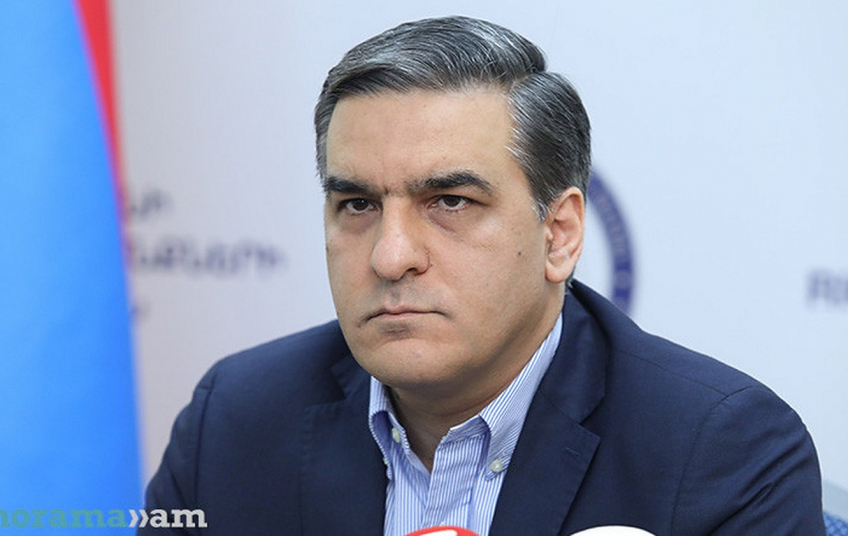Weekly update
5 February
According to the ombudsman, the Armenophobic policy backed by the Azerbaijani authorities is based on two “pillars”: religious and national affiliation—and this extends to all domains. In line with hetq.am it is not so much about Armenia’s authorities or the Armenian statehood, but about ordinary Armenians. The Human Rights Defender stressed that the intensification of the religious component is accompanied by a policy of destroying Armenian cultural heritage. Tatoyan added that the policy of hatred towards Armenians is one of the key factors for the Azerbaijani authorities to be able to retain power by sidetracking the Azerbaijani public from their domestic issues, and therefore the Azerbaijani authorities are not going to end this policy of theirs.
https://hetq.am/en/article/140801
4 February
The Human Rights Defender (Ombudsman) of Armenia, Arman Tatoyan, presented a new special report on the policy of hatred conducted by the Azerbaijani authorities towards Armenia and Armenians. As Tatoyan told a press conference Friday, this report is based on the monitoring conducted after the Artsakh (Nagorno-Karabakh) war in the fall of 20220, its research was conducted in its original—Azerbaijani—language, and it presents many specific facts.
https://news.am/eng/news/685290.html
3 February
Azerbaijan always speaks about peace with threats to destroy Armenia, Human Rights Defender (Ombudsman) Arman Tatoyan said on Wednesday. According to panorama.am, "This is not only and not so much a matter of rhetoric, but the country’s long-running state policy of Armenophobia (education, culture, sports, etc.), which is the real source of human rights violations and war crimes," he wrote on Facebook. "We need real guarantees of our rights, everything else is an illusion,” the ombudsman stressed.Tatoyan’s office has collected the parts of Azerbaijani President Ilham Aliyev's recent statements, which contain hatred and enmity towards Armenians, to submit them to international organizations.
https://www.panorama.am/en/news/2022/02/03/ombudsman-Azerbaijan-threats/2635622
2 February
US National Security Advisor Jake Sullivan spoke by phone with Dr. Ibrahim Kalin, Spokesperson and Chief Advisor to the President of Turkey, NSC Spokesperson Emily Horne said in a statement. In line with armradio.am, she said the parties discussed the tension on Russian-Ukrainian border and referred to regional issues, including efforts by Turkey and Armenia to normalize relations. Armenia and Turkey have appointed special representatives for normalization of relations. Serdar Kilic and Ruben Rubinyan held the first meeting in Moscow on January 14.
https://en.armradio.am/2022/02/02/bidens-national-security-adviser-discusses-armenia-turkey-relations-with-erdogans-spokesperson/
1 February
Russian Deputy Foreign Minister Andrei Rudenko held a telephone conversation with the European Union’s Special Representative for the South Caucasus and the Crisis in Georgia Toivo Klaar at the latter’s initiative, the Russian foreign ministry reported. According to armenpress.am the officials thoroughly discussed the current situation of the Geneva international talks over the security and stability in the South Caucasus, ahead of the next round of discussions, as well as the settlement process between Armenia and Azerbaijan.
https://armenpress.am/eng/news/1074450.html
31 January
A new nationwide poll in Armenia by the International Republican Institute’s (IRI) Center for Insights in Survey Research shows that territorial and border issues are the top national concerns. Armenians also expressed a strong desire for bilateral relations with Turkey and some openness for new cross border transport routes in the region. When asked about major problems in the country, 28% of Armenians said that territorial and border issues were their top concerns, far ahead of other issues named. “With the recent Nagorno-Karabakh conflict and a history of military confrontation in the region, Armenians are understandably concerned about national security and threats along the border,” said Stephen Nix, Director of IRI’s Eurasia Division. “They would like to see a resolution to these long-standing territorial issues.”
https://www.iri.org/resources/public-opinion-surveyresidents-of-armenia/
30 January
Speaking at "Prospects of Artificial Intelligence in Armenia: Education at the Core” conference in Yerevan, YerevanNN computer science and mathematics research lab Director Hrant Khachatryan said that while more than thirty companies operating in Armenia create products using artificial intelligence, 95% of what’s manufactured is targeted for the overseas market. In line with hetq.am, Khachatryan said the science sector lags behind others and that universities must reach out to Armenian scientists overseas and offer them jobs in Armenia. Another option is to create major scientific centers, which is quite expensive. According to Khachatryan’s calculations, $2.5 million is needed to pay four to five scientists and their postgraduate students in Armenia annually. "If we can promise such a budget to scientists working abroad, we can recruit a large number of qualified people," Khachatryan said.
https://hetq.am/en/article/140608
29 January
Since the November 9, 2020 statement by the leaders of Armenia, Azerbaijan and Russia which brought an end to the war, the borders of Armenia and the security of Artsakh have continued to come under attack. According to evnreport.com, as a result of the war, the Armenian side lost the buffer zone that kept major populations beyond artillery range. The additional hundreds of kilometers of new undemarcated borders with Azerbaijan require a new defense infrastructure that was never built. What does this mean for the conscripts and border guards that are manning these posts? Under what conditions have they been left to carry out their military duties? What we do know is that there are almost daily instances of ceasefire violations in Armenia and Artsakh. They have led to the death and capture of servicemen, civilian casualties, and the destruction of property. Since May 2021, hundreds of Azerbaijani soldiers remain on sovereign Armenian territory in Gegharkunik and Syunik regions.
https://evnreport.com/opinion/it-has-to-be-said-in-solidarity-with-our-soldiers/
Sources: hetq.am, news.am, panorama.am, armradio.am, armenpress.am, iri.org, evnreport.com





